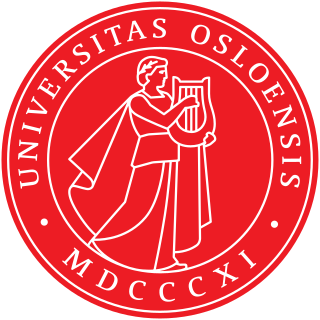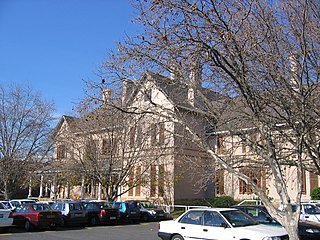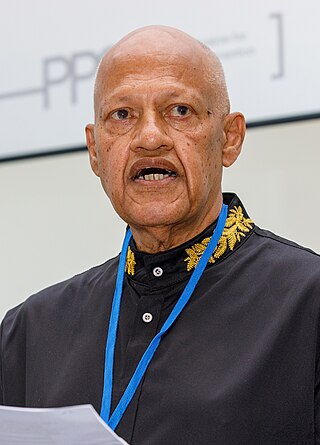
The University of Oslo is a public research university located in Oslo, Norway. It is the highest ranked and oldest university in Norway. It is consistently ranked among the top universities in the world and as one of the leading universities of Northern Europe; the Academic Ranking of World Universities ranked it the 58th best university in the world and the third best in the Nordic countries. In 2016, the Times Higher Education World University Rankings listed the university at 63rd, making it the highest ranked Norwegian university.

The University of Cape Town (UCT) is a public research university in Cape Town, South Africa. Established in 1829 as the South African College, it was granted full university status in 1918, making it the oldest university in South Africa and the oldest university in Sub-Saharan Africa in continuous operation.

The South African College of Music, abbreviated as SACM, is a department of the Faculty of Humanities at the University of Cape Town. It is located on the university's Lower Campus in Rondebosch, Cape Town.
Established in 1988, the Consortium of Humanities Centers and Institutes serves as a site for the discussion of issues germane to the fostering of cross-disciplinary activity and as a network for the circulation of information and the sharing of resources within the humanities and interpretive social sciences. CHCI has a membership of over 200 centers and institutes that are remarkably diverse in size and scope and are located in the United States, Australia, Canada, China, Korea, Finland, Taiwan, Ireland, United Kingdom, and other countries.

The Centre for Research in the Arts, Social Sciences and Humanities (CRASSH) is an interdisciplinary research centre within the University of Cambridge. Founded in 2001, CRASSH came into being as a way to create interdisciplinary dialogue across the University’s many faculties and departments in the arts, social sciences, and humanities, as well as to build bridges with scientific subjects. It has now grown into one of the largest humanities institutes in the world and is a major presence in academic life in the UK. It serves at once to draw together disciplinary perspectives in Cambridge and to disseminate new ideas to audiences across Europe and beyond.
The Clergy of the Church of England database (CCEd) is an online database of clergy of the Church of England between 1540 and 1835.
Jane Davidson is Professor of Creative and Performing Arts (Music) at The University of Melbourne and Deputy Director of the Australian Research Council's Centre of Excellence for the History of Emotions.
Michael Neocosmos is a Marxist philosopher. He is an emeritus professor in humanities at Rhodes University, Distinguished Visiting Scholar at the University of Connecticut Humanities Institute and a fellow at the Centre for Humanities Research at the University of the Western Cape.
Jane Taylor is a South African writer, playwright and academic. She currently holds the Andrew W. Mellon Chair of Aesthetic Theory and Material Performance at the Centre for Humanities Research at the University of the Western Cape in South Africa. She is the director of the Laboratory of Kinetic Objects (LoKO), a Centre for the theoretical and material exploration of the Subject/Object continuum. The Centre engages in performance arts as well as research and intellectual enquiry into the human and technological interface, Artificial Intelligence (AI) Intelligent Amplification (IA). Her recent performance/lecture “Ne’er So Much the Ape” [which takes its title from an old English adage, ‘ne’er so much the Ape as when he wears the doctor’s cape’] explores the articulation of primate research, race theory, AI, and performance theory.

Wilmot Godfrey James is a South African academic who served as the country's opposition spokesperson of health and Member of Parliament for the opposition Democratic Alliance. His constituencies were Mitchells Plain and Rondebosch. He was elected the party's Federal Chairperson between 2010 and 2015. Dr. James contested for the post of party leader in 2016, but lost the election to Mmusi Maimane. James served as director of Sanlam, Media24 and the Africa Genome Education Institute, and was chairperson of the Cape Philharmonic Orchestra and the Immigration Advisory Board of South Africa. He is also a former Trustee of the Ford Foundation of New York. He currently is a Senior Research Scholar at the Institute for Social and Economic Research and Policy and teaches a course on catastrophic risks at Columbia University in New York City. He is a senior consultant to the Washington DC-based Nuclear Threat Initiative (NTI) on biosecurity.
Larry Weir Hurtado,, was an American New Testament scholar, historian of early Christianity, and Emeritus Professor of New Testament Language, Literature, and Theology at the University of Edinburgh (1996–2011). He was the head of the School of Divinity from 2007 to 2010, and was until August 2011 Director of the Centre for the Study of Christian Origins at the University of Edinburgh.
Brian Hurwitz BA, MB BS, MA, MSc, MD, FRCP, FRCGP is a British clinician and academic and Professor of Medicine and the Arts at King's College London. He is the director of the Centre of the Humanities and Health at King's College London and is a medical General Practitioner.
The Faculty of History at the University of Oxford organises that institution's teaching and research in medieval and modern history. Medieval and modern history has been taught at Oxford for longer than at virtually any other university, and the first Regius Professor of Modern History was appointed in 1724. The Faculty is part of the Humanities Division, and has been based at the former City of Oxford High School for Boys on George Street, Oxford since the summer of 2007, while the department's library relocated from the former Indian Institute on Catte Street to the Bodleian Library's Radcliffe Camera in August 2012.

The King's College London Faculty of Arts & Humanities is one of the nine academic Faculties of Study of King's College London. It is situated on the Strand in the heart of central London, in the vicinity of many renowned cultural institutions with which the Faculty has close links including the British Museum, Shakespeare's Globe, the National Portrait Gallery and the British Library. As of 2016, the Times Higher Education comparison of world-class universities ranked it amongst the top twenty arts and humanities faculties in the world.
Traditional leaders play many roles in Zimbabwean communities, culture and families. They help to promote and uphold cultural values, facilitate development and resolving of disputes in their communities. The institution of traditional leadership is regulated and monitored within the parameters of the Constitution of Zimbabwe. These leaders are put in position by the government of Zimbabwe to work with the people. A chief is not elected into office by popular vote, but through lineage, and is thus in office for life.
The various academic faculties, departments, and institutes of the University of Oxford are organised into four divisions, each with its own Head and elected board. They are the Humanities Division; the Social Sciences Division; the Mathematical, Physical and Life Sciences Division; and the Medical Sciences Division.

University of Cape Town Libraries is the library system of the University of Cape Town in Cape Town, South Africa.
The Department of Information Studies is a department of the UCL Faculty of Arts and Humanities.
Peter Vale is a senior research fellow at the Centre for the Advancement of Scholarship at the University of Pretoria, South Africa, and the Nelson Mandela Professor of Politics Emeritus at Rhodes University, South Africa. He is also an honorary professor at the Africa Earth Observatory Network (AEON) of which he was a founding member. Notably, Vale was the founding director of the Johannesburg Institute for Advanced Study (JIAS) and acting vice-rector for academic affairs and deputy vice-chancellor of the University of the Western Cape, South Africa.
Kwesi Kwaa Prah is an author, public speaker, and a Sociology professor, who was born in Ghana and has been based in southern Africa since the 1980s. He is the author of several books, including Beyond The Color Line (1997). He has also published many articles revolving around the topics of Africa's history and what is to come in Africa's future, as well as speaking and writing on issues such as the education system and social reforms. He is vocal about the race issues in society, speaking publicly and challenging government actions. He is the founder and Director of the Centre for Advanced Studies of African Society (CASAS). He has worked in a number of universities in Africa, Europe and Asia, researching and teaching Sociology and Anthropology.






